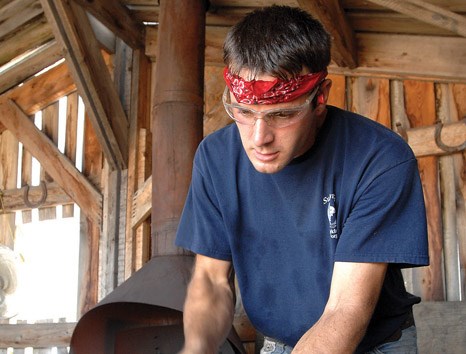Contrary to popular belief, making horseshoes by hand is more than just an oddity seen only at agricultural fairs.
Just ask Dave deWit.
"Most people are quite interested and think it's kind of quaint," deWit said when asked Friday about the responses he has had while showing off his skills in the blacksmith shop at the B.C. Northern Exhibition.
"But I don't know if a lot of people realize that this actually feasible as a career."
Three months after completing an 18-month program at Olds College in Alberta, deWit has had no end of work as a farrier and almost all the shoes he has put on have been made by himself.
"In reality, there are enough factory-made shoes that a person can certainly work full-time and not ever have to make a shoe themselves but this is more than just a job - it's a hobby, it's a passion," de Wit said. "At this point, I'm trying to hone my skills as much as possible."
There are an estimated 100,000 horses in British Columbia and deWit has routinely been putting in 10 to 12 hours a day, six days a week, trimming and shoeing horses' hooves.
After pulling those kinds of hours, the day he spent Friday in the blacksmith shop at the BCNE was something of a break. As a bonus, he was working with a hotter-burning coal fire rather than the gas-fueled version he usually uses.
"At this time of year, the sun is shining and we're all making hay," deWit said. "Everybody wants to be trail riding and everything when it's summertime and so everyone wants to have shoes on their horse yesterday.
"And then come mid-October, November everyone wants the shoes off and to have their horses out. Then everything kind of slows down and maybe we can do some skiing."
You don't necessarily need a bachelor's degree in biochemistry and molecular biology to become a farrier but deWit has one and claims it has helped.
"There is a lot of science in it and to be able to understand the language of the veterinary journals and whatnot, it's good to have," said deWit, who is also a journeyman carpenter. "It just makes us more able to serve our clients."
A good farrier can make a shoe from a single bar of flat steel in "one heat," which usually takes about five minutes. Practice makes perfect, deWit said, and also warned that the vocation can be extremely demanding and many people do not last long in the field.
"A lot of the time, it's thankless as well," he said. "People with their pets are extremely demanding. But a lot of people are also extremely appreciative for the care they get so it's really great that way."
The blacksmith shop is located near the mini-train, off to the left as you enter the BCNE fair grounds.



